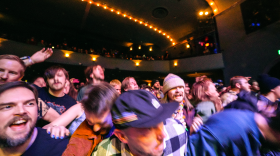The historic Englert Theatre in Iowa City recently served as the stage for a convergence of Indigenous creativity, hosting 25 Indigenous Iowa artists in a showcase featuring an array of vibrant and symbolic clothing designs. The collective effort marked the inaugural installment of what could become an ongoing series: "The Future is Indigenous" fashion show.
Among the artists featured in the show were individuals spanning generations, with participants ranging from ages eight to 75. Their creations, a fusion of traditional motifs and contemporary flair, paid homage to the profound cultural heritage embedded within Indigenous communities, and aimed to challenge and broaden societal perceptions of Native artistry.

Working to change stereotypes
At the heart of the initiative lies Alicia Velasquez, an artist and the proprietor of The House of Dotł'izhi, a boutique and gallery space in Iowa City dedicated to showcasing the works of Indigenous artists. Inspired by conversations with young Meskwaki women who felt marginalized in the art world, Velasquez embarked on a mission to redefine the narrative surrounding Native American artistry.
“In today's society, when people think of Native art, they think of cowboys and Indians, right?” Velasquez said. “They think of the 1800s Native American art. They think of Santa Fe. And yes, that is labeled Native art, but why is it okay for other artists and other cultures to evolve, but we have to stay in the 1800s?”
"Why is it okay for other artists and other cultures to evolve, but we have to stay in the 1800s?”Alicia Velasquez
"The Future is Indigenous" emerged from Velasquez's resolve to bridge the gap between tradition and innovation, creating a platform for Native artists to express their creativity without constraint. Reflecting on the genesis of the project, Velasquez remarked, “It really triggered something in me, like, ‘Wait a minute, this is not okay. This is so not okay. So how do we mix traditional techniques with our traditional art, but make it fashion-forward, right? Or put it in the mainstream?”

Questioning fashion with focus
The journey toward the fashion show found its creative hub within the walls of Iowa City's Fab Labs, a maker space that offered ample opportunities for artistic exploration. Under Velasquez's guidance, participants honed their skills in sewing and other crafts, while Kirk Cheney, the executive director of Fab Labs, lent his expertise to infuse their designs with a contemporary sensibility. This dual collaboration provided resources to build skillsets and opportunities for the young participating artists.
As Velasquez notes, "Indigenous artists have faced significant obstacles in accessing resources for their work, and systemic barriers and historical inequities have played a crucial role in hindering their efforts. These barriers can include limited access to funding, lack of representation in mainstream art institutions, cultural appropriation and challenges in preserving and promoting traditional art forms in contemporary contexts."
For Cheney, the collaboration with Velasquez represents more than just a one-time event. It signifies an ongoing commitment to breaking down barriers for artists and fostering a culture of innovation.
“‘The Future is Indigenous’ was a natural fit for us, as part of our mission is to provide tech and tools to everyone,” Cheney said. “This is doubly true for people who are ignored or passed by in the current norms of society.”
The partnership between Fab Labs and Velasquez was facilitated by a grant from the University of Iowa’s Office of the Vice President for Research, as part of their community-engaged scholars program. The initiative aimed to investigate effective methods for culturally revitalizing teaching tailored to Native American youth.
An updated aesthetic
A standout feature of the project was the reenvisioning of the ribbon skirt, a cherished emblem of Indigenous culture adorned with vibrant ribbons and colors. Symbolizing Indigenous pride, identity and reclamation, these skirts were transformed with a modern twist. Some students even incorporated LED lights into the fabric, adding a dynamic visual element to the age-old tradition.

Velasquez highlighted the cultural significance of ribbon skirts as symbols of resistance against assimilation and cultural erosion, honoring the vital roles of Indigenous women and community members. Beyond their aesthetic appeal, the versatile garments hold practical value, suitable for ceremonial gatherings or everyday attire, and embody the resilience and rich heritage of Indigenous peoples.
The fashion show not only showcased artistic talent, but also underscored the importance of recognizing and respecting Indigenous cultures. Velasquez emphasized the ways mainstream brands have historically exploited Indigenous creative contributions, making it crucial to acknowledge and honor their cultural legacy.
Reflecting on the collaborative process that led to the night of "The Future is Indigenous" show, Velasquez described the experience as profoundly healing, witnessing the unity of Indigenous elders and youth working in harmony.
For additional details regarding the Iowa City Fab Labs, visit the organization's website. Velasquez’s store, the House of Dotł'izhi, operates from 11 a.m. to 7 p.m. every Thursday through Saturday, and her Instagram account provides updates on her upcoming collections and other community events.




